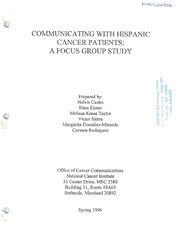
Communicating with Hispanic Cancer Patients: A Focus Group Study PDF
Preview Communicating with Hispanic Cancer Patients: A Focus Group Study
) M^-D2_p^-952) U COMMUNICATING WITH HISPANIC CANCER PATIENTS: A FOCUS GROUP STUDY 52 O^.3t=:0i0nN Preparedby: NelvisCastro EllenEisner %8 MelissaKrausTaylor -3 > co VictorSierra MargaritaGonzalez-Miranda i CarmenRodriguez OfficeofCancerCommunications NationalCancerInstitute 31 CenterDrive,MSC2580 Building31,Room 10A03 Bethesda,Maryland20892 Spring1996 COMMUNICATINGWITHHISPANICCANCERPATEENTS: AFOCUSGROUPSTUDY TABLEOFCONTENTS Page I. EXECUTIVESUMMARY 1 A. Introduction 1 B. Method 1 C. SummaryofFindings 2 D. ConclusionsandImplications 9 E. Recommendations 12 BACKGROUNDANDMETHOD II. 15 III. DETAILEDFINDINGS 18 A. ProfileofParticipants 18 B. CommonalitiesAmongVariousHispanic/Latino GroupsRepresented 18 C. OverallReactionsofParticipantstoFocusGroupSetting 19 D. AttitudesandPerceptionsAboutCancerDiagnosisand Treatment 20 E. HealthCareProvidersandCommunitySupporttoCancer Patients 23 F. InformationonCancerBeforeandAfterDiagnosis 25 G. KnowledgeandAccesstoInformationSourcesFollowing Diagnosis 26 H. KnowledgeandAccesstoCommunityOrganizations andGroups 27 I. RoleofChurchesandReligiousGroupsinCancer- RelatedIssues 28 J. SocialSupportsforCancerPatients 28 K. MediaUsageandPreferences 30 L. Cancer-RelatedMaterialsandMessages 32 M. ReactionstoVideo"Unavezalano...Paratodaunavida" 34 N. ClinicalTrials 34 O. ReactionstoCoverArtonaSpanishLanguagePublication AboutClinicalTrials 35 IV. APPENDICES A. HispanicFocusGroupModerator'sGuideforCancerPatients B. Grupodediscusionconpacienteshispanos/latinosquetienen cancer. Referenciaparalamoderadora C. CancerCareIssuesAmongHispanicPatients: RecruitingCriteria D. Temassobreelcuidadodepacienteshispanosconcancer. Grupo dediscusion. Requisitosparalaselectiondeparticipantes. E. CoverArtClinicalTrials. "^Enqueconsistenlosestudiosclinicos?' EXECUTIVESUMMARY I. A. INTRODUCTION Since1992,theHispanicEducationProgramatNCI'sOfficeofCancerCommunications(OCC) hasbeenworkingonthedevelopmentofSpanish-languageandbilingualeducationalmaterials aboutcancer-relatedissues. Thesematerialshavebeenwrittenineasy-to-understandSpanish appropriateforallHispanicgroups.However,withtherapidincreaseinnumbersanddiversityof theU.S.Hispanicpopulation,OCCconsidereditimportanttoconductadditionalqualitative researchaimedatbetterunderstandingtheHispanic/Latinoaudienceanddeterminingthemost effectivewaystoaddresstheircancerinformationneeds. Thecurrentstudyfocuseson Hispanic/Latinocancerpatients. ThepurposeofthestudywastoexamineHispanic/Latinocancerpatients'knowledge, perceptions,attitudes,practices,andhealthbehaviorsrelatedtocancercareissues. Anadditional aimofthestudywastoidentifycommonalitiesamongHispanic/Latinogroups(e.g.,Mexican Americans,PuertoRicans,CubanAmericans,CentralAmericans,andSouthAmericans), includingsourcesofinfluenceandinformationwithinthecommunitythatcanaffectbehavior change. B. METHOD AtotaloffourfocusgroupswereconductedduringFebruaryandMarch1995inWashington, D.C.,NewYork,SanAntonio,andLosAngeles. Thesecitieswereselectedonthebasisof geographicorregionalrepresentation,aswellastheirhighconcentrationofthetargetaudience (i.e.,Hispanics/Latinosoflowsocioeconomicstatus). Thecriteriaforrecruitingpatientsensuredthatvariouscountriesoforiginwouldberepresented ineachgroupsession. Allfocusgroupsweredividedbygendertoencourageopen communicationandtogetmoredetailedinformationfrommalesandfemalesregardingtheir healthcare. ThefocusgroupsessionsinWashington,D.C.,andSanAntoniowerecomposed entirelyoffemalecancerpatients,whilethesessionsinNewYorkandLosAngeleswere composedofmalecancerpatients. Participantsinthefocusgroupswerefairlyhomogeneousinage,language,andincome. All participantswerebetween45and65yearsofage,spokeprimarilySpanishathome,andhadan annualhouseholdincomeof$25,000orless. ThegroupswereconductedinSpanishbya bilingual/biculturalfemalemoderatorandabilingual/biculturalfemaleresearchassistant.. Toassistwithresearchplanningandimplemention,anAdHocWorkingGroupwasestablished composedofrepresentativesfromtheNationalHispanicLeadershipInitiativeonCancer (NHLIC);outreachcoordinatorsfromNCI'sCancerInformationService(CIS);OCCstaff members;andotherprofessionalswhoregularlycommunicatewithHispanics/Latinoson health. Inseveralcities,therecruitmentofpatientswasfacilitatedbylocalrepresentativesfrom thesegroups. Forexample,CISoutreachcoordinatorsandNHLICrepresentatives,aswellaskey leadersincommunityhealthclinics,providedassistanceinWashington,DC,SanAntonio,and NewYork. InLosAngeles,aHispanic/Latinoresearchvendorwasusedforrecruitment. At eachsite,aSpanish-language"screeningquestionnaire"wasusedtoidentifythespecificvariables andcharacteristicsconsideredimportantforrecruitment. Topicsonthemoderator'sdiscussionguideincludedparticipants'knowledgeandbeliefsabout cancerpriortoandfollowingdiagnosis;adequacyofinformationreceivedondiagnosisand treatment;awarenessanduseofcommunityresourcesprovidingcancerservices(e.g.,support groups,800lines);useofSpanish-andEnglish-languagemedia;reactionstosegmentsofa30- minuteSpanishvideoonmammographyandbreastcancer("Unavezalano...Paratodalavida"); andknowledge/awarenessofclinicaltrials. C. SUMMARYOFFINDINGS CommonalitiesAmongtheVariousHispanic/LatinoGroupsRepresented Ingeneral,differencesincountryoforigindidnotaffectgroupdynamics. Allparticipants feltcomfortablewitheachotherandexpressedasenseofbelongingtoalarger Hispanic/Latinocommunitythatwentbeyondspecificnationalities. Participantsindicated thattheyhaveastrongsenseofcommunityandthatpeersupportfromotherSpanish- speakingHispanic/Latinocancerpatientsisveryimportanttothem. Therewerefew noticeableand/orsignificantdifferencesbycountryoforiginamongtheparticipants. GeneralReactiontoFocusGroupSetting ParticipantsseemedtoenjoyinteractingwithotherHispanic/Latinocancerpatientsinthe groupdiscussionformat. Theyweregenerallypleasedwiththefocusgroupsetting, describingitasagoodchannelbywhichtogetinformationandemotionalsupport. Both menandwomenshowedempathytowardtheirpeersandofferedemotionalsupportas needed. Manyfeltthattheyhadresponsibilityforreachingoutandhelpingother Hispanics/Latinos. OverallAttitudesandPerceptionsofCancerDiapnosisandTreatment Lackofknowledge,languageproblems,andaccessbarrierspreventedthevastmajorityof participantsfromgettingregularcancerscreeningtestsbeforetheywerediagnosedwith cancer. Althoughmosthavelearnedmoreaboutcancerscreeningtestssincethattime, somestillthinkthesetestsmaynotbetotallyreliable. Mostparticipantswereawareofatleastsomebehaviorsorfactorsthatplacepeopleat riskofgettingcancer. Afewparticipantssuspectedtheyweregoingtogetcancereither becausethereweremanycasesofcancerintheirfamiliesorbecausetheysmokedorhad beenexposedtofumesfromtoxicsubstances(e.g.,glue,chemicals). Themajorityofparticipantswereseriouslyconcernedabouttheeffectthattheircancers werehavingontheirfamilies. Thisattitudereflectsacentralculturalvalueofthe Hispanic/Latinocommunity,inwhichthefamilyunitisconsideredmoreimportantthan theindividual. Supportfromfamilymembers,particularlyspousesandchildren,wascrucialintreatment decisionsfornearlyallparticipants. Inmostcases,supportfromthefamilydeterminesif thepatientwillgetintotreatment,whattypeoftreatmentheorshewillget,aswellas compliancewithtreatmentandotherdoctor'srecommendations. PeersupportfromotherHispanic/Latinocancerpatientsalsoplaysaroleindecision- making. Afewparticipantswhobelongtosupportgroupsstatedthattheyhavetakenthe experiencesofothercancerpatientsintoaccountwhendecidingontreatmentoptionsor supportservices. Mostparticipantsexpressedinterestinestablishingandmaintaining contactwithotherHispanic/Latinopatientsasawaytoaccessinformationabout treatmentandsupportservicesandtoobtainemotionalsupport. Mostparticipantsstartedtreatmentshortlyafterdiagnosisandfollowedtheirdoctors' treatmentrecommendations. Forsome,placingblindtrustandfaithinhealthcare providers(i.e.,notaskingquestionsorseekingsecondopinions)wasanaturaloutcomeof theesteemwithwhichphysiciansareviewedintheircommunity. Otherparticipants, however,saidtheyfollowedtheirdoctors'recommendationsbecausetheyfelttheyhadno otherchoice--doctorsweretheironlyhopeforsurvival. Someindividualshadthe impressionthathealthcareprovidersmaybetryingtreatmentsandmedicationsonpatients withoutknowingiftheywillbeeffective. Manyparticipantshadusedfolk/homeremediesfortheircancer. Ahighleveloftrustwas expressedinfolkremedies,particularlyin"unadegato"(cat'snails),anherbthatistaken fromaplantwhichcanbeusedasteaorinpills. Manyparticipantstrulybelievethatthis folkremedycancurecancer. Inmostcases,however,folkremediesareusedasa complementto,notasubstitutefor,biomedicaltreatmentandmedications. PerceptionofHealthCareProviders Overall,participantswhohadaHispanic/Latinodoctorreportedamoresatisfyingdoctor- patientrelationshipthanthosewhodidnot. Manysaidthattheywouldprefergoingtoa Hispanic/Latinohealthcareprovider,butthatitisverydifficulttofindone. Agenerallackoftrustinnon-Hispanic/Latinohealthcareproviderswasexpressedby L someparticipants. Inparticular,womenwhohadexperiencedsymptomsorsignsof cancerbeforediagnosiscomplainedthatvarioushealthcareprovidershadmisdiagnosed them.Somewomenalsoreportedalackofsensitivityandhumanenessonthepartofnon- Hispanichealthcareproviders,indicatingthattheseindividualshadtreatedthemasthough theyweremakinguptheirsymptomsandsignsofcancer. Thisinsensitivitywasalso evidentinhealthcareproviderswhoeitherstatedorimpliedthatparticipantsweregoing todieofcancer. Negativefeelingswereexpressedaboutthelackofpersonaltouchthatpatientsexperience innon-Hispanicdoctor-patientrelationships. Traditionally,Hispanics/Latinosconsider thistobeakeyelementintheirassociationwithhealthcareproviders. Participants indicatedthatwhenhealthcareprovidersdonottakethetimetoexplaincancerand treatmentoptionstotheirpatients,itsuggestsadisrespectfulattitude. Someparticipants,particularlymen,feltthatmostofthehealthcareprovidersthey encounterjustwanttomakemoneyanddonotcareenoughaboutthemaspatients. PersonalandCommunityReactiontoCancer Allparticipantsfeltdevastatedwhentheylearnedtheyhadcancer,viewingthediagnosis asapersonalandfamilytragedy. Thisdevastationandsadnessmaybeseenasareflection ofthe"fatalismo"(fatalisticattitude)thatiscommonintheHispanic/Latinoculture. Mostparticipantswerealsooverwhelmedwithanxietywhentheywerediagnosed. They werefearful oftheconsequencesthatcancertreatmentwouldhaveontheirbodies,and terrifiedofdyingandnotbeingabletotakecareoftheirfamilies. Thisfearcausedafew participantstoremaininastateofdenialovertheirdiagnoses. Afewparticipantsindicatedthattheyfelt"inferior"and/or"incomplete"becauseoftheir cancer. Theseindividualswerereluctanttodisclosetheircancertoothersforfearof beingrejectedordiscriminatedagainst. Someparticipants,particularlywomen,reported feelingembarrassedbecausetheythoughtpeoplewouldthinktheywereunabletotake careofthemselvesandtheirfamilies. Thisattitudereflectstheimportancethatsome Hispanic/Latinowomenplaceontheirroleascaretakerofthefamily,arolewhichthey feeltheymustassumeevenwhentheyaresick. Amongthemen,somestatedthatcancerhascausedthemtofeelthattheyarenotas strongastheyshouldbetoworkandtakecareoftheirfamilies. Thisattitudereflectsthe "machismo"mentalityintheHispanic/Latinoculture,amentalitywhichrequiresmento actastheprotectorofthefamilyandnotshowanyweakness. Severalindividualsclaimedtheyhadexperiencedrejectionbecauseoftheircancer. Afew participantswhohadlostweightfromtheirdiseasesaidthattheindividualswhospurned themprobablythoughttheyhadADDS,notcancer. Severalwomenindicatedthattheyhad beenrejectedorabandonedbytheirhusbandsorpartners. Oneparticipantlosther apartmentandwasharassedbypeoplebecausetheythoughtherdiseasewascontagious. Severalparticipants,infact,pointedoutthatsomepeopleinthecommunitythinkthat canceriscontagious. (Note: Thesestories,takentogether,denotealackofknowledgeof cancerissuesamongsomesectorsoftheHispanic/Latinopopulation.) InformationaboutCancerBeforeandAfterDiagnosis Thevastmajorityofparticipantsdidnotknowverymuchaboutcancerwhentheywere diagnosed. Manysaidthattheyonlyknewitwasan"incurable"anddevastatingdisease. Thevastmajorityofparticipantsdidnotreceiveanywrittenoraudiovisualinformationon canceroritstreatmentaftertheirdiagnosis,andnoneweregivenSpanish-language materialsorinformation. Thetwoparticipantswhoreceivedwritteninformationin Englishwereunabletouseitbecauseoflanguagebarriers. Mostinformationabout cancerwassaidtobegivenorallybydoctorsandnurses. Themajorityofparticipants, however,experienceddifficultyinunderstandingtheirhealthcareprovidersbecauseof languagebarriers. Forthesereasons,manygroupmemberswerestillconfusedabout cancer-relatedissues. Themajorityofparticipantsrelyonfamilymemberstocommunicatewithhealthcare providers. Mostparticipantshaveseriousdifficultiescommunicatingwithhealthcare providersbecausetheycannotspeakorfullyunderstandEnglish. Afewparticipantsuse interpretersfortheirdoctors'appointments,asituationthatsometimescausesconfusion wheninformationreceivedbyfamilymembersdoesnotagreewiththatreceivedby interpreters. KnowledgeandAccesstoInformationSourcesAfterDiagnosis LackofknowledgeoftheEnglish-languagepreventsthemajorityofparticipantsfrom gettingcancerinformationand/ormaterials. Mostparticipantsperceivethatthereisalack ofcancer-relatedinformationinSpanishbecausetheydonotknowaboutanyservices and/ormaterialscurrentlyavailabletothem. ManyparticipantsreportedgettingcancerinformationfromtheSpanish-languagemedia, primarilyfromSpanish-languageradiotalkshows. Theyhavealsoacquiredinformation fromSpanish-languagetelevisionnewscastsandshows,althoughnotonaregularbasis. A fewhaveobtainedinformationfromSpanish-languagelocalcommunitynewspapers. ThevastmajorityofparticipantswouldbeinterestedinreceivingSpanish-language audiovisualandwritteninformationoncanceranditstreatment. Mostbelievethat informationaboutcancershouldbegiventoboththepatientandhisorherfamily,since familymembersareinvolvedinallmedicalandemotionalaspectsofthedisease. Themajorityofparticipantswoulduseatoll-freenumbertoseekcancerinformationif theywereabletogetinformationinSpanish. Theywouldalsousesuchaservicebecause theycanremainanonymousandcallatatimethatisconvenientforthem. NoneoftheparticipantswereawareofanyGovernmentagencythatprovidesinformation aboutcancer. Themajoritysaidtheywouldliketoreceiveinformationfroma Governmentagencybutonlyifitisanagencydedicatedtomedicalresearch. KnowledgeofandAccesstoCommunityOrganizationsandGroups Themajorityofparticipantswerenotawareofanyorganizationsorgroupsthatprovide healthinformationand/orservicestotheHispanic/Latinocommunity. Afewparticipants mentionedtheAmericanRedCross,andafewwomeninSanAntoniomentionedthe AmericanCancerSociety(ACS). Asawhole,participantswerenotpersonallyinvolvedin communityorganizationsorgroups,althoughafewwomeninSanAntonioweretaking partinsupportgroupssponsoredbytheACS. LackofoutreachintheHispanic/Latinocommunityaswellasalackofprograms specificallydirectedtoHispanics/Latinospreventparticipantsfromseekingservicesfrom communityorganizations. Mostparticipantsindicatedaninterestingettinginvolvedwith andusingservicesthataredirectedtoSpanish-speakingHispanic/Latinocancerpatients. OnlyoneparticipantknewabouttheCISSpanish-languagetoll-freenumber. Shelearned abouttheservicebyreadingabrochurethatshereceivedatacommunityclinic. Whenshe calledtheCIS,shewaspleasedwiththeinformationprovidedbythecancerinformation specialist. RoleofChurchesandReligiousGroupsinCancer-RelatedIssues Commentsbythevastmajorityofparticipantsshowedverystrongreligiousbeliefsand values. Nearlyallparticipants,bothwomenandmen,saidthattheirfaithinGodhas helpedthemtosurvivecancer. ThevastmajorityofparticipantswereCatholicandgoto Mass,butmanyarenotactivelyinvolvedeitherinthechurchorreligiousgroups. Onlya fewparticipantsarereceivinghelpandsupportfrompriestsandnuns. Onemangives testimoniesabouthiscancerinchurchandalsovolunteerstohelpothercancerpatients andtheirfamilies. SocialSupportsforCancerPatients Familymemberswerecitedasthemainsourceofsupportforthevastmajorityof participants. Familymembersprovidetransportation,helpdecideontreatmentoptions, translateduringdoctors'appointments,providefinancialresourcestopayfortreatment, andofferemotionalandmoralsupport. Accordingtoparticipants,thebondsbetween membersofmostHispanic/Latinofamiliesaresostrongthatthediseaseofonefamily memberusuallybecomeseveryone'sdisease. AdultHispanic/Latinosonsanddaughters feeltheyhaveresponsibilityfortakingcareoftheirsickparentsand/orsistersandbrothers evenwhentheyaremarriedandhavefamiliesoftheirown. Afewparticipantswhose familieswerenotintheUnitedStatesreportedgettingsupportfromclosefriendswhoare alsoHispanics/Latinos. Thevastmajorityofparticipantsnotedthatthereisnomechanismwhichprovides Hispanic/Latinocancerpatientswithinformationaboutavailablesupportservices. In general,theyfeelthathealthcareprovidersshouldbeprovidingthemwithinformationon cancerservicesandmaterials,oratleastreferringthemtoplaceswheretheycangetit. Themajorityofparticipantswouldliketoparticipateinsupportgroupsiftheywere availableinSpanish. TalkingtootherHispanic/Latinocancerpatientswouldhelpbreak theirsenseofisolation,givingthemanopportunitytosharecommonexperiences, exchangeinformation,andprovideandreceiveemotionalsupport. Someindividuals notedthatsupportgroupsshouldalsobeavailableforfamilymembersandclosefriends whotakecareofcancerpatientsbecausethesepeoplesufferalongwiththepatient. Severalgroupparticipantswerereceivinghelpfromsocialworkersreferredtothemby theirhealthcareproviders. Thesepatientsweregenerallypleasedbecausethesocial workershadreferredthemtoplaceswheretheycouldobtainmoreinformationand/or othersupportservices. Onlyafewfemaleparticipantshadreceivedprofessionalcounselingservicestohelpthem copewithcancer. Oneindicatedthathercounselorhadsavedherlifeaftershetriedto commitsuicidefromhercancer-relateddepression. Manywomenandonemansaidthat theywouldliketoreceivecounselingservicesbuthavenotseenthemavailableinSpanish. MediaUsageandPreference ThemajorityofparticipantsprefertheSpanish-languagemedia,withSpanish-language televisionbeingthemostpopularmediachannel. Newscasts,soapoperas,talksshows, newsmagazineshows,andvarietyshowsarewatchedmostfrequently. Spanish-languageradiotalkshowsthatfocusonhealtharealsoverypopularamong participants. Theseshowsaredescribedasbothinformativeandinteractivebecausethey allowthepublictocallinwithquestionsonhealthissues. Thehostsoftheseprogramsare generallylocalHispanic/Latinophysicianswhoareverywellknowninthecommunityand useavarietyofchannelstodisseminatetheirhealthmessages. Someoftheshowsalso promotetheuseofnaturalmedicineandfolkremedies. Printmediaarenotusedonaregularbasisbymostparticipants. Nevertheless,some participantsreadSpanish-languagecommunitynewspapersforlocalnewsand entertainment. Afewparticipants,mostlywomen,enjoyreadingSpanish-language magazinesonaregularbasis.
